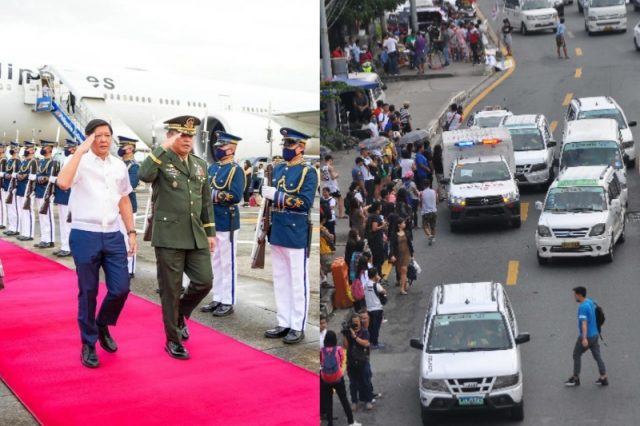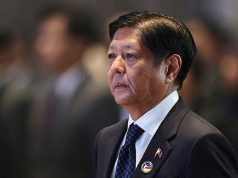
Amid reports of the president’s increased travel funds for next year, some Filipinos raised concerns about a potential transport crisis as the deadline for franchise consolidation for public utility vehicles (PUV) approaches.
President Ferdinand Marcos Jr. will have a P1.408 billion budget for his domestic and international travels in 2024, according to the Republic Act No. 11975 or the General Appropriations Act (GAA) of 2024.
It is a 58% increase from the P893.87 million travel funds requested by his office in 2023.
Marcos has been on 19 foreign trips since he took office last June, with his international travels nearly doubling from last year.
This, despite saying he would have fewer travels abroad last January.
In September, Marcos was reported to have exceeded his allocated travel budget by overspending by P84 million in 2022, spending a total of P398 million. It was higher than his allocated travel budget of P314 million, according to the 2022 GAA.
Potential transport crisis in PH
The rise in the chief executive’s travel budget drew criticisms from some Pinoys who brought up potential additional transport woes in the coming year as the government fully implements the PUV Modernization Program (PUVMP).
“Let this sink in: A heightened transport crisis will greet Filipinos in 2024 as 73.5% of jeepneys (in Metro Manila alone) may not be allowed to operate. But Marcos gets a 58% increase in travel funds for trips where benefits are yet (if at all) to materialize,” sociologist Athena Presto said.
“Pero tayo, mga komyuter na majority, biyaheng impiyerno sa 2024 kapag ni-phaseout ang jeeps at tumaas ng 40 ang minimum pamasahe! The irony sa ilalim ng pahirap at garapalang Marcos-Duterte gov’t!” Kej Andrés, chair of the Student Christian Movement of the Philippines, said.
“Billion ang budget para sa travel. This, in the face of our existing and potentially even more public transport woes because of their jeepney phaseout move. Let that sink in,” another Filipino commented.
“All this while jeepney drivers and operators are on the brink of losing their livelihoods by 2024 (upside down smiling emoji) ibang klase ang kapal ng mukha,” a different online user said.
“Napaka-komportable [niyo] naman ata ho [nang] sobra, ser
@bongbongmarcos. Tapos ‘yung commute namin next year ‘pag phinaseout ‘yung mga jeep, pahirapan? #NoToJeepneyPhaseout,” commented another online user.
Under the government’s PUVMP, the franchises of PUV operators and drivers who won’t be able to file for consolidation will be revoked by Jan. 1, 2024, making them unable to travel.
The prohibition will reportedly affect the livelihood of 140,000 jeepney and UV Express drivers, excluding 60,000 operators.
The government said that the PUVMP aims to “transform the public transport system” to make it “more dignified, humane, and on par with global standards.”
It requires franchise holders to consolidate and join cooperatives which will supposedly enable them to acquire loans that will help them afford eco-friendly e-jeeps or minibuses powered by Euro IV-compliant engines that could cost up to P2.8 million each.
PUV operators and drivers have been holding transport strikes to oppose the move.
As of Thursday, the Land Transportation Franchising and Regulatory Board (LTFRB) issued a new memorandum saying that unconsolidated PUV operators will be allowed to operate until Jan. 31, 2024 if there are only less than 60% of the number of authorized units plying certain routes.
The routes will be determined by the LTFRB board.
Marcos’ travels
Meanwhile, in defense of the president’s 2024 travel budget, Presidential Communications Cheloy Garafil said that it is intended to enhance the country’s appeal to potential investors.
She said that the invitations received by the Office of the President from foreign governments and international entities had increased significantly after the World Health Organization declared an end to COVID-19 as an international public health emergency.
The Department of Trade and Industry also said that Marcos’ foreign trips have yielded P294 billion worth of investments and 200,000 job opportunities.
It added that these investments are in various stages, noting that the amount comprises 148 projects.
Months prior to the 2024 national budget deliberations, Budget Secretary Amenah Pangandaman said that Marcos’ travel funds could be used to promote the country overseas as an “investment hub” to help its economy following the slowdown brought by the COVID-19 lockdowns.
“There was no travel before because of the pandemic, and we have to consider [that] this is a new administration. We have to show to other countries our economy is open, and that we have new policies for investment,” she said before.
This was criticized by opposition lawmakers who said that the president’s trips were “lavish,” citing his trip to the World Economic Forum in Switzerland last January where the Philippine delegation reached over 70.
Senate Minority Leader Koko Pimentel III said that while Marcos “intends to travel more” for investments and other matters, the latter should be aware of “local” problems as well.
“He should be aware that our people’s problems are more local than he thinks,” the lawmaker said to reporters.
Pimentel then cited the issue of food production in the country.
“Food production means we need to produce more food from our own land. Food importation is not the same as food production,” he said.









